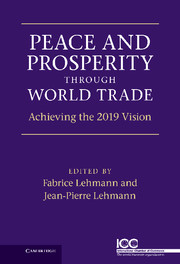Book contents
- Frontmatter
- Contents
- Notes on contributors
- Foreword
- Preface: the ICC vision
- Historical overview and dynamics
- Editorial note
- A Global systemic transformations
- B Governance of global trade
- Editorial introduction
- B1 Securing the global trade regime: the demand for global governance
- B2 The trade regime and the future of the WTO
- B3 WTO reform: the time to start is now
- B4 ‘Murky protectionism’ and the WTO
- B5 Preferential trade agreements: imagining a world with less discrimination
- B6 The G-20 after the Great Recession: rebalancing trade
- B7 The missing piece: global imbalances and the exchange rate regime
- B8 Trading knowledge fairly: intellectual property rules for global prosperity and environmental sustainability
- B9 Trade and subsidies: undermining the trading system with public funds
- B10 Trading labour: a dilemma for migration regimes
- C Poverty and global inequities
- D The long view on interlocking crises
- E Global business responsibilities
- Conclusion: the imperative of inclusive global growth
- Index
B1 - Securing the global trade regime: the demand for global governance
Published online by Cambridge University Press: 05 July 2011
- Frontmatter
- Contents
- Notes on contributors
- Foreword
- Preface: the ICC vision
- Historical overview and dynamics
- Editorial note
- A Global systemic transformations
- B Governance of global trade
- Editorial introduction
- B1 Securing the global trade regime: the demand for global governance
- B2 The trade regime and the future of the WTO
- B3 WTO reform: the time to start is now
- B4 ‘Murky protectionism’ and the WTO
- B5 Preferential trade agreements: imagining a world with less discrimination
- B6 The G-20 after the Great Recession: rebalancing trade
- B7 The missing piece: global imbalances and the exchange rate regime
- B8 Trading knowledge fairly: intellectual property rules for global prosperity and environmental sustainability
- B9 Trade and subsidies: undermining the trading system with public funds
- B10 Trading labour: a dilemma for migration regimes
- C Poverty and global inequities
- D The long view on interlocking crises
- E Global business responsibilities
- Conclusion: the imperative of inclusive global growth
- Index
Summary
The world lacks systematic global economic policy coordination from its existing institutions. More specifically, the governance of global trade and the stability of the international trade regime have clearly been affected by the fallout from the wider economic turmoil of 2008–2009. The multilateral trade system is threatened by the perception that globalization has been tarnished by speculative investment and other excesses in financial markets seeking larger profits at the expense of sound business practice. Growing public anger about bad practice in the financial sector since 2007 spilled over into a growing demand for protectionism. This connection might be irrational, but it is all too easily made. Indeed, it is part of a disturbing trend towards rising economic nationalism. Unfairly, the WTO often carries the criticism for excesses in other sections of the global economy, especially the financial sector.
Not only is the future collective management of the global economy crucial to the environment in which trade governance exists, but the architecture of the trade regime will need to accommodate the new stresses placed upon it by questions of sustainability and economic development emanating from the financial crises and the protective sentiments and practices that have ensued. The WTO cannot nor should it try to address all these issues. However, it is apparent that in an increasingly interdependent world, trade policy makers can ignore neither the context in which they operate nor the need to contribute to the resolution of other challenges.
- Type
- Chapter
- Information
- Peace and Prosperity through World TradeAchieving the 2019 Vision, pp. 73 - 77Publisher: Cambridge University PressPrint publication year: 2010

